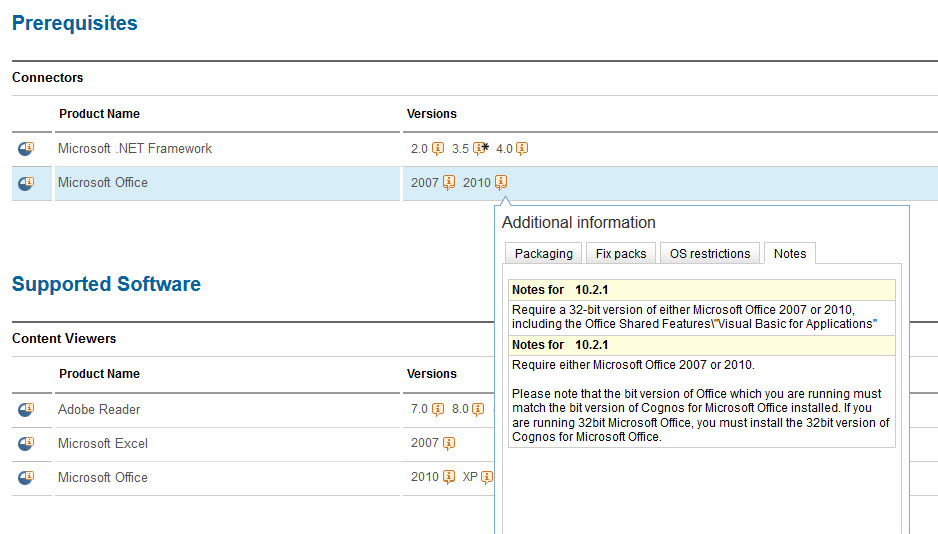tomok wrote:winsonlee wrote:MS office 2010 64 bit should be supported.
Where exactly in those two links did you see it mentioned that the 64-bit version of Office works with CX?
Not openly, but in the second link there is a pop-up in the Prerequisites link that is as misleading as all getout and is recorded below for the sake of posterity in case they change it:

- VersionOfOffice.jpg (130.87 KiB) Viewed 8963 times
I don't think it's too unreasonable to believe that "bit version of Office... must match the bit version of Cognos" implies that if you're running 64 bit Cognos, well then, you go right ahead and use 64 bit Office, compadre!
Except that below that we have "Supported Software" links. (Links which interestingly list only "2010" and "XP" and not that abomination 2007 or the fine but overtaken by time 2003, but I suppose that those are implied.) When you click on those pop-ups, then
there you will find a note that "only the 32 bit version is supported".
I've noticed some "get with the times" criticism of IBM over this but to be honest I don't think it's justified in this case. I haven't been able to find any useful statistics on 32 bit vs 64 bit usage, though it's worth noting that Statcounter is still registering over 17% of non-mobile computers running XP, and it's for sure that very few of those are 64 bit. (And that a lot of them are in a corporate environment.) Probably most newer O/S installations are 64 bit but it's a fair bet that a chunk of the (51%) of Win 7 O/S's are still on 32 bit as well. Write your code for 64 bit and you lose all of those people as a potential market. Write your code for 32 bit and you can sell into both the 32
and 64 bit spaces.
And what's the benefit of using the 64 bit Office? Well, it can access more memory; you're no longer constrained by the 2GB limit. Which raises the question "what the
h3ll are you doing in Office that requires more than 2 GB of memory?" Access? Yeah, sure... but if that's the case you kick its slow-moving butt to the kerb and go SQL Server. And you
might get a little more speed depending on a whole buncha factors. With applications like Photoshop which is always pushing maths out on the bleeding edge to model light it's worth it. With the TM1 server which needs prodigious amounts of memory it's worth it. With Office, not so much on the benefits side.
On the down side?
A whole raft of useful Excel add-ins stop working when you go the 64 bit route, and not just Perspectives.
And the big one... yeah, sure, 64 bit Office will be able to
access more memory but with double-the-size pointers it will
consume more memory as well. A
lot more memory. And while that may be less of an issue with decent hardware, in the corporate space in particular you have vendors who will cut to the bone to make their profit margins and continue to ship units, particularly notebooks, with only 4GB of RAM to keep the production cost down another 50 to 100 bucks (at most). Walk through any "box shifter" store and browse through the notebooks on offer; 4 Gig, 4 Gig, 4 Gig, Oh wow, 8 Gig... and it has a $300 price premium, that's nice. 4 Gig, 4 Gig...
All this considered I suspect that 32 bit Office will remain the dominant one for quite a while to come (as will be the case with most non-specialist applications, I think) simply because there's little up side and a fair amount of down side to migrating. Consequently I'm not blaming IBM for not putting 64 bit Office support at the forefront of their plans.